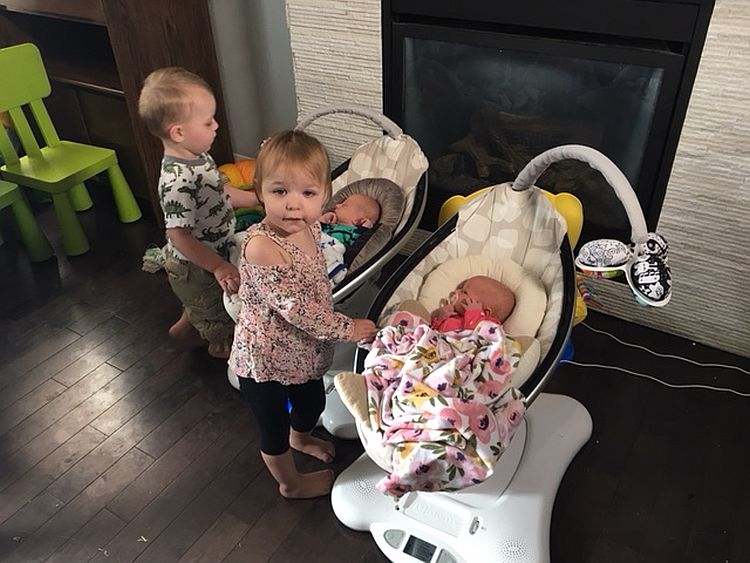
Every year, the number of twins born in North America increases.
In Canada, 11,680 twins were born in 2016, compared to 7,864 in 1991, according to Statistics Canada.
Experts say the increase is primarily due to the use of fertility treatments and women delaying childbirth.
Nancy Segal is a psychology professor who also serves as the director of the Twin Studies Center at California State University in Fullerton. She is also the author of Twin Mythconceptions.
According to Segal, fertility treatments account for two-thirds of the increase in multiple births, while one-third is due to women delaying having kids.
READ MORE: Alberta quadruplets ‘healthy and happy’ as they turn 3
She said some couples tend to have fraternal twins if they run on the woman’s side of the family.
Despite no factor being a guarantee, Segal said women who are taller and heavier, or who have had previous children or who have African-American ancestry, tend to have a higher chance of conceiving fraternal twins.
“Fraternal twins tend to be born to mothers who have had previous children and to older mothers,” she said.
Families with multiple sets of twins
However, for some families, multiple sets of fraternal twins are natural and a complete surprise.
In Alberta last month, an Edmonton family welcomed their second set of fraternal twins, while a family from Red Deer welcomed their third set. For both families, no fertility treatments were used.
READ MORE: Alberta couple welcomes third set of fraternal twins: ‘We’ll call it quits here’

Get daily National news
Megan and Justin are parents who live in Edmonton. They said they were shocked to learn they were having their second set of fraternal twins.
“Everybody we’ve talked to that has twins always said that they always have one after, so we were just prepared to have one,” Megan said. “I wanted two or four — I always wanted that even number. But we ended up with five, so definitely not trying for that six.”
The couple has five children under the age of four: a three-year-old daughter, 21-month-old twins and now newborn twins. Their second set of twins were born on April 27, 2019 and like their first set, they were delivered vaginally.
“Our life was already crazy enough with the three [children],” Megan said.
“But we couldn’t be happier with our big family.”
Megan said if they do end up deciding to go for a sixth child, they will likely adopt to avoid the chance of having twins again.
Myth – Twins skip a generation
One widely held myth is that twins skip a generation, but Segal said there’s no truth to the statement.
“There’s nothing that really says that fraternal twins skip generations. It’s conceivable that it can happen in some families, but there’s no necessary rule to that whatsoever,” Segal said.
Myth – Certain foods increase chances of conceiving twins
A community in Aruba, Nigeria has a high number of twins being born and there are claims that it’s because of the white yam women eat that has an estrogen-like substance, according to Segal.
“I would not advise everyone to go out eating white yams because there are other biological factors that these women have, including hormonal levels that probably couldn’t be replicated,” Segal said.
Myth – Identical twins have one placenta and fraternal have two
Fraternal twins are two separate fertilized eggs, whereas identical twins come from one egg that divides into two. Typically, fraternal twins develop two placentas and identical twins share one. However, that is not always the case.
“One third of identical twins have two placentas and about half of the fraternal twins have one, simply because the placentas fuse and give the superficial impression of being one,” Segal said.
The number of placentas does not necessarily indicate whether twins are identical or fraternal, Segal said.
Myth – Boy/girl twins can be identical
Megan and Justin said they often get asked whether their boy/girl twins are fraternal or identical. Identical twins are conceived from one egg splitting in two, so both babies have to be the same sex.
“They assume that they’re identical and they’re boy/girl. It’s funny to us. People don’t know,” Megan said.
Myth – Twins have telepathy
Segal said there’s no evidence to prove that twins can communicate through any type of parapsychology process.
“There’s just no evidence for it.” Segal said.
Myth – Twins mean double the work
Megan and Justin agree that with two children the same age, they always have someone else to play with and that they don’t always need to be entertained, which cuts down on the work involved for parents.
Want more ways to keep up to date? Check out the “Family Matters” podcast! If you haven’t subscribed yet — what are you waiting for?
Subscribing’s easy! Here’s how…

- Open the Apple Podcasts app, search for “Family Matters” and select it from the list of results.
- Once on the Family Matters page, click the “Subscribe” button to have new episodes sent to your mobile device for free.
- Click the name of an episode from the list below to listen.

- Open the Google Podcasts app, search for “Family Matters” and select it from the list of results.
- Once on the Family Matters page, click the “Subscribe” button to have new episodes sent to your mobile device for free.
- Click the name of an episode from the list below to listen.








Comments
Want to discuss? Please read our Commenting Policy first.